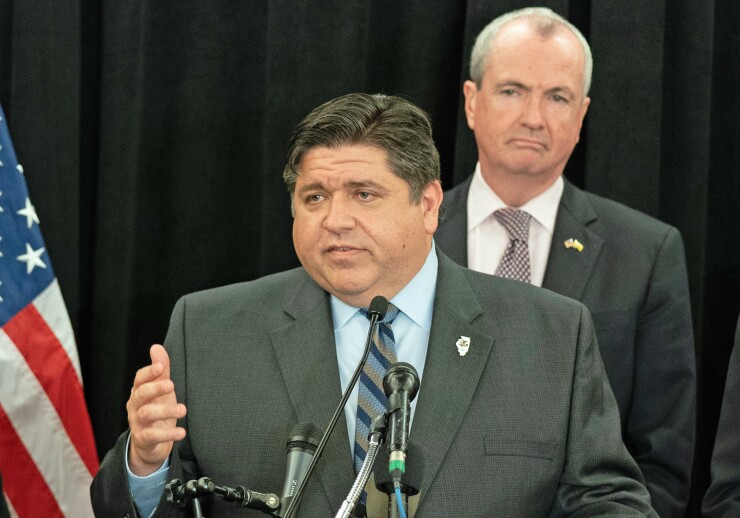CHICAGO — Illinois Gov. J.B. Pritzker is getting more specific about his plan for graduated state income tax rates.
Pritzker promoted in his 2018 campaign plans to push for a constitutional amendment to allow Illinois to move to a graduated tax rate system from the state constitution's current flat rate mandate.

On Thursday, Pritzker unveiled
The governor said his plan could raise $3.4 billion annually as a long-term fix for the state’s fiscal ills.
The state faces what is now a $3.2 billion deficit, an $8 billion unpaid bill backlog, and a $133.7 billion burden of unfunded pension liabilities. He crafted his proposed fiscal 2020 budget as a “bridge” to the adoption of graduated income tax rates.
“Instituting a fair tax as I’ve proposed will improve the arc of our state’s finances forever and make our system more fair for everyone,” Pritzker said. “The fair tax would eliminate the budget deficit, balance future budgets and reduce the pension liability by producing revenue of $3.4 billion.”
Pritzker, a Democrat, is banking on drumming up public and legislative support by arguing the alternative to tackling the state’s red ink is deep cuts of 15% in state services or a 20% tax hike on all incomes at the flat rate and he dismisses critics’ warnings that residents and businesses will flee.
The proposed rates are competitive with neighboring states like Iowa and Wisconsin that impose a graduated tax and the stability provided by the new revenue may prove a selling point, he insisted.
“I think if people see Illinois has its fiscal house in order, people will want to be here and want to create jobs here and want to invest here,” Pritzker said.
The current individual rate of 4.95% would be replaced with rates that begin at 4.75% on the 27.2% of taxpayers with the lowest incomes of up to $10,000. The 58.9% of taxpayers with incomes up to $100,000 would pay 4.90%. The 11.1% of taxpayers in the next bracket up to $250,000 would pay 4.95%.
Those earning up to $500,000 would pay 7.75% on their bracket, those earning up to $1 million would pay 7.85%, and those making more than $1 million would top out 7.95%. The top three tiers represent about 2.8% of taxpayers. The brackets would apply to individual and joint filers.
The plan also offers a 20% increase in the current property tax credit taxpayers can claim on their returns and creates a new $100 child tax credit that can be claimed on a sliding scale based on income.
The corporate income tax rate would go 7.95% from 7%.
“Under this plan, everyone who earns up to $250,000 will pay the same or less than what they’re paying today. That’s 97% of Illinoisans,” said Pritzker, a wealthy heir to a family fortune, businessman and philanthropist, who said taxpayers like him should bear the brunt of shouldering the burden of stabilizing state finances.
While negotiations are beginning with lawmakers, Pritzker and his finance team will meet early next week with rating agencies. The timing of his announcement on rates was not linked to rating agency meetings, Pritzker said. The administration has its first bond sale coming up later this month.
“There’s not a timing relationship between the two but what is important is, I think, for bond investors to see that Illinois is finally dealing with its challenges and we are finally balancing the budget of the state,” the governor said.
Illinois is the lowest-rated state by several notches with its general obligation debt at Baa3 with a stable outlook from Moody's Investors Service, BBB with a negative outlook from Fitch Ratings, and BBB-minus and stable from S&P Global Ratings.
The governor’s nearly $39 billion general fund spending plan has been panned by civic groups, investors, and analysts for failing to make progress on structurally balancing the state’s budget and shorting pension contributions on the promise of future funding hikes. Fitch Ratings and S&P Global Ratings have warned the budget, if passed in its current form, could damage the state’s rating.
A three-fifths supermajority legislative vote is needed to put the tax measure on the ballot, which could occur in November 2020, and then a three-fifths supermajority of voters must approve it. Pritzker's fellow Democrats enjoy such a supermajorities in the General Assembly but some Democrats could push back on the rates. Republicans are opposed.
House Republicans are backing a measure opposing a shift to a graduated tax and the Senate Republican caucus issued a statement saying: “Without guaranteed protections for middle class families, we are opposed to the governor’s $3.4 billion tax increase.” Some critics warn the constitutional change would make it too easy for lawmakers to lift rates going forward instead of showing spending restraint.
“Taxing businesses and business owners without restraining state spending nor taking measures that will spur economic growth sends exactly the wrong message to job creators who are already questioning their commitment to Illinois,” Illinois Chamber of Commerce president Todd Maisch said in a statement.
House Speaker Michael Madigan, D-Chicago, has said he supports negotiations on a graduated income tax.
“For years people have been saying Illinois should be more like our neighboring states with more modern and fairer tax systems,” said John Patterson, spokesman for Senate President John Cullerton, D-Chicago. “He eagerly awaits negotiations.”
Labor and education groups offered positive comments and municipalities may also get on board as they could benefit because they receive a share of income taxes through the state’s Local Government Distributive Fund program.





